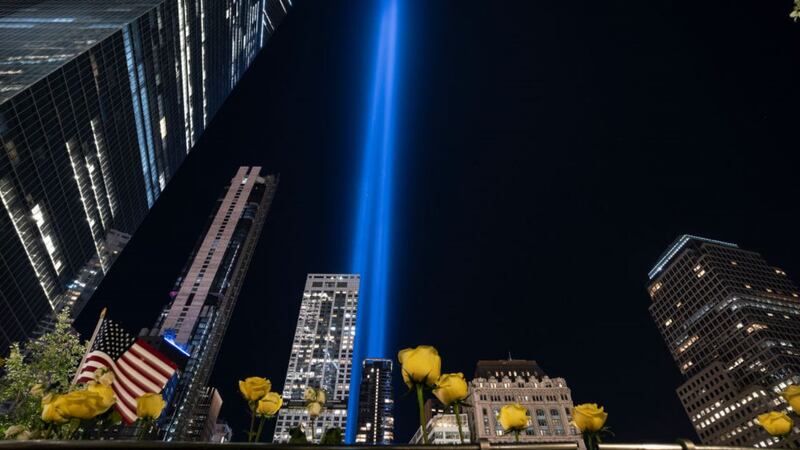Lt. Gov. Mark Schweiker was heading to the Philadelphia area on Sept. 11, 2001 when he got word of the attacks on the World Trade Center in New York City and the Pentagon in Washington.
Schweiker then immediately turned around and began heading to the state Capitol in Harrisburg. He then received word about United Airlines Flight 93.
“We were informed by the FBI that they were tracking United flight 93 which had originated in New Jersey, crossed over in Pennsylvania, and turned around unexpectedly over Ohio. At that point, the FBI had an obligation to inform the state’s Governor and Lt. Governor that since they were in Pennsylvania airspace, that we needed to be thinking about monitoring, and if there were an ugly, violent end and a crash, that we had to be prepared for the consequences,” Schweiker told Channel 11′s Rick Earle during a recent interview outside the state Capitol in Harrisburg.
When they soon learned that the plane had crashed in a remote area in Somerset County near Shanksville, they began mobilizing resources.
“So, whatever they needed was provided. Plenty of resource deployment defined how we operated that day in Western Pennsylvania " said Schweiker.
Days after the crash, Schweiker visited the scene.
“I think the most vivid memory is the carnage and what little was left of that large airliner, probably no bigger than the engine hood of a sedan, a car; and the impression that it was so final. I mean they hit, that plane went in at 560 miles per hour. So, very little was left, whether it was personal belongings, to the fuselage, to the plane itself is what struck me. And then I have to say while we observed the evil that manifest that day, these American-hating terrorists commandeering four planes that were to travel the country from the east to the west coast, that the good of humankind was apparent as well. Whether the hardworking first responders, many of them volunteer firefighters, who never left the site, to those who provided food and meals, and social service support to the surrounding hotels who provided lodging for the first responders, so we saw plenty of the ugly evil and we saw the good of humankind as well,” said Schweiker.
In the days and weeks ahead, Schweiker and the rest of the world learned about the heroic passengers, who fought back and prevented the terrorists from flying the plane into the U.S. Capitol or the White House.
“Somewhere you know just shy of that Latrobe area over Westmoreland county, the deployment had begun. Their deployment had begun and armed with nothing but hot water, ... airplane knives and a food cart that moved up and down the aisle, so their sense of obligation to we as Americans in their mind (was) to prevent the possible air attack of (Flight) 93 hitting the Capitol. They stood up and took on the terrorists, and we all remember Todd Beamer who, and it was one of those remarks that has lived with me forever, which is. ‘Let’s roll’; and I remain very mindful of that kind of pursuit and commitment that they brought to that mission, aboard Flight 93 on 9/11,” said Schweiker.
Less than a month after the attacks, Schweiker would become governor of Pennsylvania, when Gov. Tom Ridge was asked by President George W. Bush to become the first Secretary of Homeland Security.
Schweiker also turned his attention to the security of the Keystone State, convincing legislators to lift the cap on the number of state troopers, adding 100 new troopers to bolster the state’s safety efforts.
Perhaps Schweiker’s defining moment came less than a year after 9/11, when he oversaw the harrowing and dramatic rescue at Quecreek Mine, just 12 miles west of the crash site.
“Lord knows we needed that feeling and that outcome given what we had experienced 11 months earlier,” said Schweiker.
On this 20th commemoration of 9/11, Schweiker has some strong feelings about accountability.
A decade ago, U.S. forces shot and killed Osama bin Laden, the leader of al-Qaida, the group responsible for 9/11. Today, five co-conspirators, including Khalid Sheikh Mohamed, the man who allegedly planned the 9/11 attacks, have yet to go to trial. They remain in custody in Guantánamo Bay.
“If anything, this 20th commemoration is about seeing to it that Americans do remember, we have full memory of what happened, and at least on the judicial front, that trial should begin and soon,” said Schweiker.
With the recent developments in Afghanistan, where the Taliban seized control after the withdrawal of U.S. forces, Schweiker now fears that the region could once again become a breeding ground for terrorists that want to harm Americans.
“If you would have said to me 20 years ago, that on this day that we’ll be trying to figure out or deal with perhaps reconstitution of al-Qaida or ISIS elements that could think about a second attack on the U.S., I would have said you need your head examined; but now whether it’s President Biden’s CIA director, or the director of national intelligence or the chairman of the Joint Chiefs, that is a real possibility now, so we’ve got our work cut out for us. We need to be on top of our game,” said Schweiker.
Schweiker served out the remaining two years of his term, and then got out of politics, returning to the business sector. He’s currently working as a consultant, but still keeps tabs on state politics.
TRENDING NOW:
©2021 Cox Media Group






